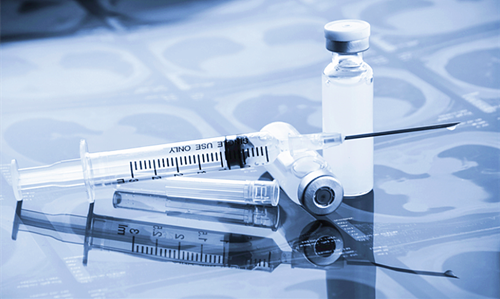CDC backs GSK’s Shingrix over Merck & Co’s Zostavax
October 30, 2017
Source: Pmlive
 1,337
1,337

Prospects for GlaxoSmithKline’s new shingle vaccine Shingrix have been raised after US advisors recommended that it should be used instead of rival Zostavax from Merck & Co.
The Centres for Disease Control (CDC) and Prevention’s Advisory Committee on Immunization Practices (ACIP) voted by a slim margin - eight to seven - in favour of GSK’s vaccine, which was approved in the US earlier this month and is a key component of the company’s commercial strategy in the next few years with sales expected to exceed £1bn (around $1.4bn).
The panel backed GSK’s two-dose subunit vaccine over Merck’s single-dose live, attenuated shot because it exhibits greater protective efficacy, particularly in older people, and also said Shingrix could be used in patients who have previously received Zostavax. The recommendation now goes to the CDC which will make a final decision.
The news came as GSK reported a 4% increase in third-quarter revenues to £7.8bn, with prescription pharmaceuticals rising 3% to £4.2bn and despite meeting analyst expectations, shares in the company took a dive.
Investors seemed to be spooked by comments by chief executive Emma Walmsley about the possibility of bids for consumer healthcare units put up for sale by Pfizer and Merck, which would eat into dividends, as well as the potential costs associated with preparing for Brexit. She emphasised on a conference call however that investing in prescription pharma - and specifically R&D - remains the priority.
Once again HIV therapies Tivicay (dolutegravir) and Triumeq (dolutegravir, abacavir and lamivudine) - up 45% to £1.47bn - led the advance amongst GSK’s prescription pharma business, with support from new asthma therapy Nucala (mepolizumab) and other new products which helped the respiratory franchise grow 11% to £5.10bn.
That helped offset continued declines for GSK’s past-its-prime asthma and chronic obstructive pulmonary disease (COPD) therapy Advair/Seretide (fluticasone propionate/salmeterol), which saw sales decline 7% to £2.34bn and still faces the start of generic competition in the US in the coming months.
Nucala itself saw sales more than double to £91m, but the approval of new triple therapy Trelegy (fluticasone furoate/umeclidinium/vilanterol) - billed as another key growth driver - came too late in the quarter to register on the results.
Prospects for GlaxoSmithKline’s new shingle vaccine Shingrix have been raised after US advisors recommended that it should be used instead of rival Zostavax from Merck & Co.
The Centres for Disease Control (CDC) and Prevention’s Advisory Committee on Immunization Practices (ACIP) voted by a slim margin - eight to seven - in favour of GSK’s vaccine, which was approved in the US earlier this month and is a key component of the company’s commercial strategy in the next few years with sales expected to exceed £1bn (around $1.4bn).
The panel backed GSK’s two-dose subunit vaccine over Merck’s single-dose live, attenuated shot because it exhibits greater protective efficacy, particularly in older people, and also said Shingrix could be used in patients who have previously received Zostavax. The recommendation now goes to the CDC which will make a final decision.
The news came as GSK reported a 4% increase in third-quarter revenues to £7.8bn, with prescription pharmaceuticals rising 3% to £4.2bn and despite meeting analyst expectations, shares in the company took a dive.
Investors seemed to be spooked by comments by chief executive Emma Walmsley about the possibility of bids for consumer healthcare units put up for sale by Pfizer and Merck, which would eat into dividends, as well as the potential costs associated with preparing for Brexit. She emphasised on a conference call however that investing in prescription pharma - and specifically R&D - remains the priority.
Once again HIV therapies Tivicay (dolutegravir) and Triumeq (dolutegravir, abacavir and lamivudine) - up 45% to £1.47bn - led the advance amongst GSK’s prescription pharma business, with support from new asthma therapy Nucala (mepolizumab) and other new products which helped the respiratory franchise grow 11% to £5.10bn.
That helped offset continued declines for GSK’s past-its-prime asthma and chronic obstructive pulmonary disease (COPD) therapy Advair/Seretide (fluticasone propionate/salmeterol), which saw sales decline 7% to £2.34bn and still faces the start of generic competition in the US in the coming months.
Nucala itself saw sales more than double to £91m, but the approval of new triple therapy Trelegy (fluticasone furoate/umeclidinium/vilanterol) - billed as another key growth driver - came too late in the quarter to register on the results.
By Ddu
Read more on
- How are Vaccines Stored? December 6, 2020
- Why do Vaccines need to be Refrigerated? December 5, 2020
- BioNTech & InstaDeep launch AI innovation lab for next-generation vaccines and biopharmaceuticals November 28, 2020
- Moderna coronavirus vaccine shows ‘promising’ safety and immune response results in published Phase 1 study, but more research is needed July 15, 2020
- What ingredients are in vaccines? December 17, 2019
your submission has already been received.
OK
Subscribe
Please enter a valid Email address!
Submit
The most relevant industry news & insight will be sent to you every two weeks.



